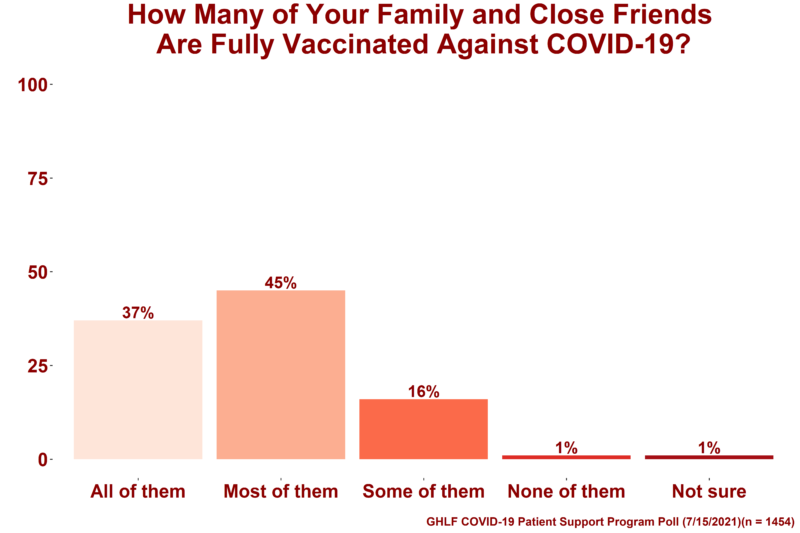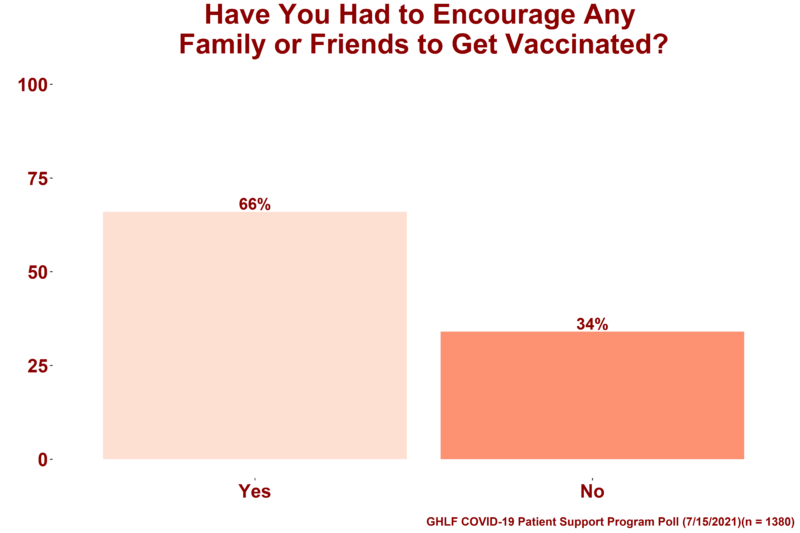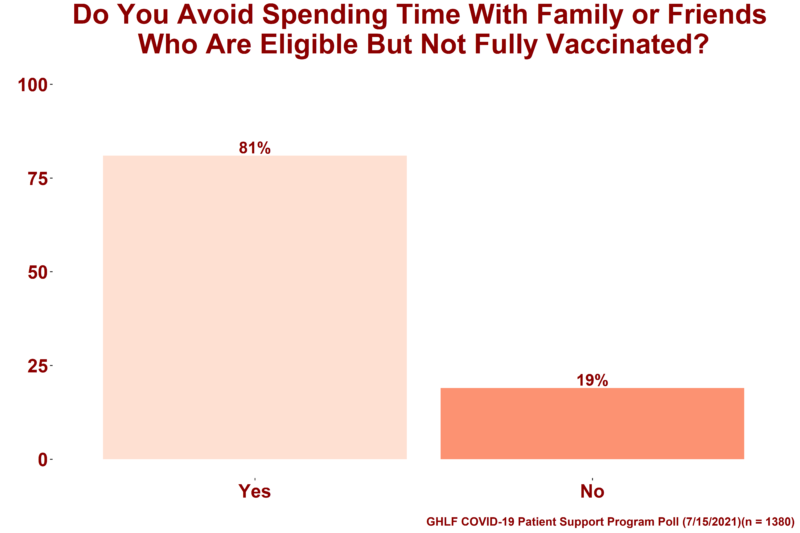Learn more about our FREE COVID-19 Patient Support Program for chronic illness patients and their loved ones.
Ideally, as more people become eligible to receive the COVID-19 vaccine, more people will get the vaccine. But that doesn’t seem to be the case in the United States. Despite the fact that anyone in the United States over the age of 12 is eligible for the COVID-19 vaccine, only 48 percent of the population is fully vaccinated, according to Our World In Data. Meanwhile, new COVID-19 infections are on the rise. Between July 1 and July 19, the number of new COVID-19 cases increased by 238 percent (16,505 new cases to 55,828 new cases in the 19-day span).
There are several reasons for the stall in vaccination rates. To start, racial and economic disparities make it harder for certain groups of people to get the vaccine — even if they want it. People in low-income communities, for example, may not have the internet access to schedule a vaccine appointment or lack transportation or the ability to take time off work. Some people may face language barriers when registering online and when they arrive at the vaccination site. Some people of color may be to get vaccinated due to longstanding mistrust in the health care system.
Then there are those who refuse to get the vaccine due to political beliefs and misinformation. These people — the vaccine hostile, according to the Washington Post — are loudly spreading their message in hopes that others will follow suit.
People who are vaccinated and are not high-risk for COVID-19 may roll their eyes at the vaccine hostile but may still spend time with loved ones who fall into that camp because it doesn’t pose as big of a threat to their health.
People who are immunocompromised, however, can’t have it both ways. Even if they are fully vaccinated, people who are immunocompromised may not garner a full immune response to the vaccine. This means they may still be vulnerable to COVID-19 and, therefore, must keep taking precautions to protect themselves from the virus. This includes wearing a mask, practicing social distancing, and, in some cases, cutting people out of their lives.
A recent poll of 1,454 people, conducted by the Global Healthy Living Foundation (GHLF) as part of its COVID-19 Patient Support Program, aimed to gain insight into how immunocompromised people handle interactions with family members and friends who are not fully vaccinated, despite being eligible.
- 95 percent of respondents said they are fully vaccinated
- 37 percent of respondents said all of their family and close friends are fully vaccinated
- 44 percent of respondents said most of their family and close friends are fully vaccinated
- 16 percent of respondents said some of their family and close friends are fully vaccinated
According to the poll results, many people who have chronic illnesses or autoimmune diseases have had to convince their loved ones to get vaccinated — and no longer spend time with those who are not.
Immunocompromised people often use their health status to convince others to get vaccinated.
As part of the poll, patients were asked if they have had to convince any family members or friends to get the COVID-19 vaccine. Of the 1,380 who responded to this question, 66 percent said yes.
Trying to convince someone you love to get vaccinated can be challenging, especially if their decision is rooted in religious or political beliefs or misinformation. In a free response section of the poll, many people shared that they’ve tried to get through to vaccine hesitant loved ones by centering the conversation around their chronic illness.
“I am immunocompromised and on Rituxan, and although I was vaccinated, [I] later found out that I had no B cells, so I am extremely cautious,” one person shared. “It makes me so angry to find out about friends who don’t believe in the vaccine, or who feel it’s an issue of rights over health. I can only hope by telling my story, they will reconsider.”
“I explain that I am immunocompromised because of rheumatoid arthritis (RA) and because of the medications I have to take to treat RA,” another patient wrote. “I say the amount of protection I have against COVID-19 may not be sufficient to keep me safe and I need to rely on everybody else to get vaccinated.”
“I’ve told people if they really care about my safety, they will get the vaccine and protect immunocompromised people like me,” one person shared.
One respondent shared the story of their daughter-in-law’s battle with COVID-19. “Her heart stopped but the doctors were able to get it beating again,” they wrote. “She was hospitalized for 18 days, 10 of which she was on a ventilator. She has lung damage and is on oxygen. That has convinced some to get vaccinated.”
Others have tried to use science to sway people, stressing, as one person wrote, that “the U.S. will not reach herd immunity until the majority of people are fully vaccinated.”
But many shared that they still can’t get through to others to convince them to get the vaccine. For example, one person wrote, “most of my family [members] are very resistant to getting vaccinated, regardless of what I try to tell them or teach them, even though I’m a health care provider and immunocompromised.”
Many immunocompromised people have decided to stop seeing unvaccinated loved ones.
We asked respondents if they avoid spending time with family or friends who are eligible to get the vaccine (e.g., not children under age 12) but not fully vaccinated. Of the 1,380 who answered the question, 81 percent said yes.
For some, choosing to distance themselves from loved ones has cost them human contact and happiness.
“I am still in isolation, regardless of what my friends and family are doing,” one patient wrote. “Being around others is simply too risky at this time, which is depressing and frustrating.”
“I still don’t see many people and I know it’ll probably be a long time before I can feel safe to socialize like in the before-COVID times,” another person shared.
“Seeing friend’s pictures of their illegal beach parties made me feel hurt and increasingly isolated,” one patient wrote. “The unwillingness of my friends and family to get vaccinated has been the latest provocation of these feelings. What does it mean when even my loved ones won’t protect me from disease?”
For others, the decision to prioritize their health cost them relationships.
“[My] daughter was scheduled for a vaccine and became pregnant. Her OB-GYN recommended that she wait for the third trimester or delivery [to get vaccinated]. It’s a problem, because she is not vigilant about [wearing] a mask in public, and it’s hurting our relationship,” one patient wrote.
“I have four adult children and one doesn’t believe in the vaccine. I also have one sister who won’t get vaccinated. This situation has caused a divide in my family,” another shared.
“Being immunocompromised has me in a difficult position. Because I wear a mask and am vaccinated, I am seen as a sell-out by family members,” one person wrote. “It’s been heartbreaking.”
Several people noted that they have disowned friends who chose not to be vaccinated, writing that “friends who refuse vaccinations for misinformed reasons are no longer friends,” and that “any friend of mine who refuses to get vaccinated is becoming an ex-friend.”
Immunocompromised people who do spend time with unvaccinated loved ones proceed with caution.
Nearly 20 percent of respondents (nearly all are fully vaccinated themselves) reported that they do not avoid spending time with people who are unvaccinated because, as one patient wrote, “the relationships are more important to me.”
That said, many shared that they are taking extra steps to ensure their safety.
“I still wear a mask when outside with them and avoid being inside with them,” one person shared.
Another person echoed this, noting that “if vaccinated friends or family members spend time with people whose vaccine status is unknown, I mask when I am with them and limit our time together.”
“I only meet non-vaccinated friends outdoors, and stay six feet apart,” another patient wrote.
The Global Healthy Living Foundation is committed to providing ongoing education about COVID-19 vaccines for the chronic illness and immunocompromised community.
To stay informed about the latest COVID-19 vaccine news for people who are immunocompromised, take immunosuppressant medications, or have autoimmune conditions, follow all of our COVID-19 vaccine coverage here.
Get Free Coronavirus Support for Chronic Illness Patients
Join the Global Healthy Living Foundation’s free COVID-19 Support Program for chronic illness patients and their families. We will be providing updated information, community support, and other resources tailored specifically to your health and safety.
About the Patient Support Program Quick Poll
Members of our program have underlying health issues — such as inflammatory arthritis and other autoimmune conditions, heart disease, lung disease, diabetes, and more — that may increase their risk for COVID-19 complications. They are interested in understanding the best ways to stay safe during the pandemic and to be part of a community of people with similar concerns, questions, and fears.
We regularly poll members, who live in the U.S. as well as around the globe, about a variety of topics, including how the pandemic is affecting their lifestyle, mental health, chronic disease management, medication adherence, and more.
We use this information to inform the educational resources we provide and to inform other stakeholders — such as public health experts, policymakers, advocacy groups, health care professionals, and pharmaceutical companies — about chronic illness patients’ needs and concerns. You can participate in ongoing polls by joining the support program here.
Coronavirus in the U.S.: Latest Map and Case Count. The New York Times. July 20, 2021. https://www.nytimes.com/interactive/2021/us/covid-cases.html.
Coronavirus (COVID-19) Vaccinations. Our World in Data. https://ourworldindata.org/covid-vaccinations?country=~USA.
Diamond D, et al. Vaccine hesitancy morphs into hostility, as opposition to shots hardens. The Washington Post. July 15, 2021. https://www.washingtonpost.com/politics/covid-vaccines-biden-trump/2021/07/15/adaf6c7e-e4bd-11eb-a41e-c8442c213fa8_story.html.

![0721_PSP_0715_Write_Up_logo An illustration of a hand, which has red pain spots, holding a cell phone. The phone shows a text message chain that reads: [On a gray background with black text to the left of the screen] Dinner tonight? [On a red background with black text to the right of the screen] Are you vaccinated yet? [On a gray background with black text to the left of the screen] No. [On a red background with black text to the right of the screen] Then no L On the illustration reads the stat: 81 percent of immunocompromised people avoid spending time with family and friends who are eligible to get the COVID-19 vaccine but are not vaccinated](https://creakyjoints.org/wp-content/uploads/2021/07/0721_PSP_0715_Write_Up_logo-800x525.jpg)







